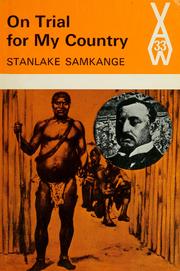 |
| On Trial for My Country |
When the Ides of March claimed of Zimbabwe’s most accomplished man of letters, Prof Stanelake Samkange, in 1988, former Chief Justice Enoch Dumbutshena’s graveside eulogy attacked Zimbabwe for ignoring its best writers.
Samkange was a first generation African novelist, public intellectual, journalist, nationalist, educationist, ethnographer, philosopher and historian. Ironically, the average Zimbabwean is preoccupied with stale jokes on the social networks to spare a thought for our literary legacy.
His prolific inventory across varied genres includes On Trial for My Country (1966), Origins of Rhodesia (1968), The Mourned One (1968), African Saga (1970), Year of the Uprising (1978) Hunhuism or Ubuntuism (1980), Among Them Yanks (1985) and On Trial for That UDI (1986).
“So far Samkange is the most prolific and versatile writer that Zimbabwe has produced,” veteran journalist Willie Musarurwa, wrote in the Scribe’s Scroll column.
“His novels, most of them historical, reveal a Dickensian characterisation – highly personable and most eccentric characters. The plots and characters are ingeniously constructed, exposing an author with a fertile imagination,” Musarurwa’s obituary said.
Dumbutshena was riled by the lukewarm appreciation by fellow authors and the public for Samkange’s work despite the renown it enjoyed abroad.
“It is the citizens of each country who pick up and expose the achievements of those achievers who have distinguished themselves. I sincerely believe that a nation that ignores the achievements of its people is a sick nation,” Dumbutshena said.
That was 1988. Things have since changed, not for better but for worse! Not only are Samkange’s books ignored, they are now out of circulation in Zimbabwe. Possibly the name Samkange only rings a bell for the average youth with respect to the feminine third of 2BG.
The Greeks have preserved and recently digitised their Homer, Socrates, Plato and Aristotle. The Romans have fortified their Virgil and Dante from the wear of centuries.
The English have their Elizabethans, Jacobeans, Puritans, Cavaliers, Augustans, Romantics, Victorians, and Modernists intact for ages to come.
Never mind, it’s the 21st century, the digital revolt. Zimbabwe cannot account for works by its best writers because it’s hooked up on mundane sites and talking about the latest “celebrity” scandal. Dumbutshena must be rolling in his grave on how low our society is sunk.
Ngugi WaThiongo once said “Literature is the honey of a nation’s soul preserved for her children to taste forever a little at a time.”
If Ngugi’s metaphor deserves the benefit of doubt, then Zimbabwe’s soul is a hollow abode open for manipulation by offshore ideologies. We are shunning the contributions of our best minds as archaic when those we are deigning to imitate assign the utmost worth to ideas.
Dumbutshena’s words, from 1988, are still a poignant wake-up call for us to introspect where we are headed as a nation. Key is a speed trap for our digital excitability.
Intellectual Thoroughbred
When most natives either regarded education as the preserve of the white settler, were trained enough to be profitable labourers, or confined to the base of the literacy pyramid by the bottle-necking system, Samkange somehow fell for Alexander Pope’s advice.
“A little learning is a dangerous thing/ drink deep or taste not the Pierian spring/ There shallow draughts intoxicate the brain/ And drinking largely sobers again,” the famous couplets from Pope’s Essay on Criticism must have landed on a soft spot of Samkange’s heart because he was a slavish devotee of books for the greater part of his life.
By 1978, he had taught at Harvard University and Fisk University, capping the feat with professorship in African History at Northeastern University in Boston, Massachusetts.
Musarurwa was convinced that only a full biography could do justice to Samkange’s fascinating life and distinguished exploits. To date, no James Boswell or Samuel Johnson is up for the tedious task.
“Countless words, both here and overseas, have been expended in appraising the life of the late Professor Stanlake James Thompson Samkange and the sum of his total contribution to the quality of the life and the literature of his people and his country.
“Even then only a small fraction of his the action-packed life of this great son of Zimbabwe who died on March 6 has been touched,” Musarurwa wrote.
President Robert Mugabe said it was worrying that Samkange’s homage should be paid by foreigners not his own people whom he wrote for and about.
“In the sphere of our country’s history, Stanlake became a prodigious and dramatic writer, vividly portraying successive chapters of our history and the history of some of our tribes.
“We know that during his stay in the United States he made great contribution to the understanding of African history as he taught and lectured on this subject. His contribution to learning shall live forever after him,” President Mugabe said.
The Journey Retraced
Samkange was born in Chipata, Zvimba Tribal Trust Land, in 1922, to a Methodist clergyman and nationalist Reverend Thompson Samkange and an evangelist from the same sect, Grace Mano.
The Samkange family lived in Bulawayo and moved to Mashonaland during Samkange’s childhood. Along with his brother, Sketchley, he was educated at the missionary-run Waddilove Institution before moving to Adams College in South Africa. In 1948, he became native graduate after earning a B.A (Honours) in History.
“On his return, he took up a teaching post at Epworth Mission where he teamed up with Willie Dzawanda Musarurwa, another political giant from Zvimba, and became active in journalism and in politics. For many years, like his father, he was General Secretary of the African National Congress,” Professor George Kahari told delegates at the occasion of Nyatsime College Golden Jubilee celebrations last year.
“In 1950 he successfully launched, as a self-help venture, a scheme for Africans to build and direct Nyatsime College, which was to provide academic, technical and commercial education.
“The college was originally to be to be sited on a farm in the European area, belonging to Mr. Thornicroft. This was unacceptable to the white regime but was finally approved to be where it is today, in the Seke Tribal Trust Land,” Kahari said.
Samkange dabbled in liberal politics during the 1950s and 1960s, within the liberal circles, opted out upon realising that the white minority was not up for majority rule in Rhodesia.
He moved to the United States where he where he took a Ph.D. from the Indiana University at Bloomington. He worked as a journalist and set up his own public relations firm, aside his work at Fisk, Harvard and Northeastern.
Controversy and Obscurity
Phillip Brooks once said biography is the meeting of three characters of whom the most interesting is the subject, the most privileged is the reader and the least regarded is the author.
One wonders whether this was not the case with Samkange, who after endowing the book sector with proficient contributions and helping put Zimbabwe on the academic map, withdrew into obscurity and oblivion.
Musaemura Zimunya mentions in Those Years of Drought and Hunger that the history of Zimbabwean literature is incomplete without the pioneer work on the historical novel.
Zimbabwe’s first historical novel “On Trial for My Country” appeared in the African Writers Series in 1965 and, according to the publisher, stood for a long time as the only Rhodesian contribution to the series.
“Origins of Rhodesia” won the 1970 Herskovits Award of the African-American Studies Association as the best book for the year.
Not much has been done to preserve this charted legacy, possibly because Zimbabwe’s reading culture is currently as hearty as a toddler’s appetite for solids.
Samkange had a taste for nobility and was frequently profiled in the press for his properties and business exploits in a predominantly settler’s world.
When he returned from England he bought a massive property called the King’s Castle and moved in with his newly married American beauty Tomy-Marie.
They were soon joined by two brilliant sons, Stanelake, currently the director of the World Food Programme and Harry, who has since inherited his father’s creative mantle with a historical novel The Chevalier d’Argentolle (2012) to his credit.
Samkange was also one for controversy, difficult to agree with and conscious of his accomplishments to a fault.
In 1983, he turned down an invitation to the Zimbabwe International Book Fair. “I felt insulted. I didn’t think that with nine titles under my belt I should go to listen to some people who haven’t written a single book.”
When everyone was debating on whether Zimbabwe should have a one-party state or a multi-party-state during the late eighties, Samkange had other ideas. “How about having a no-party state?” he wrote in the Sunday Mail.
That was the nutty professor, Zimbabwean literature’s carbon copy of Dr Samuel Johnson, that English lexicographer who had no soft spot for modesty.
Dumbutshena’s foregoing attack was particularly levelled against younger writers whom he accused of ostracising Samkange from his due share of eminence in the book sector.
Zimunya, then secretary general of the Zimbabwe Writers Union, leapt to the defence: “If one wished to look for any sickness in our society at this juncture, I would hardly point at our younger writers.”
Considering the lapse of years, one is compelled to agree with Zimunya. The sickness is in older writers who have not done anything to preserve the sluggish but sure exodus of key texts that helped define Zimbabwean literature.
Nationalism and Faith
Samkange is remarkable is in that faith and nationalism were not incompatible in his work as in other African authors, notably Okot p Bitek, Taban lo Liyon and Ngugi Wa Thiongo.
“For the Samkange clan, nationalist politics was an expression of Christian religious spirituality, and for Stanlake, writing fiction was a function of his religious and political beliefs,” says the Literary Encyclopaedia.
African authors have indiscriminately attacked Christianity as a relic of colonialism. Samkange acknowledges historical problems associated with the coming of the Gospel to Africa but is wary of throwing the baby away with the bath water.
Samkange incriminates the wayward messenger but acknowledged the authenticity of Christianity itself, which was not a European religion in any case.
“They created the impression, in the African mind that the fatherhood of God, and the brotherhood of man were only spiritual and unreal and preserved for the life after death,” Samkange’s protagonist in The Mourned One bemoans the conduct of missionaries who professed fraternity on the pulpit but maintained disparity between races in daily social intercourse.
Samkange remain a devout Christian to the end of his life and, according to Arthur-Jim Patsanza, never missed an opportunity to sing Charles Wesley’s All for a Thousand Tongues to Sing the Redeemer’s Praise.


